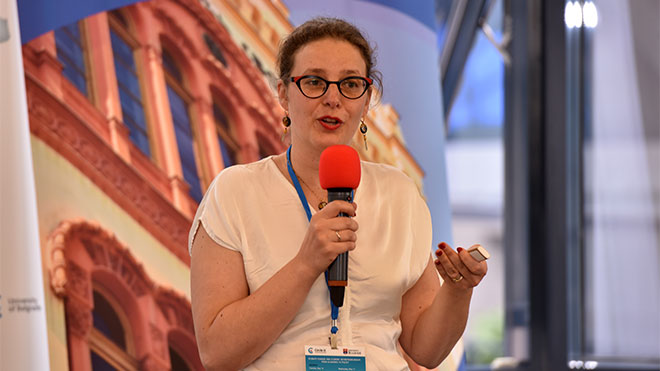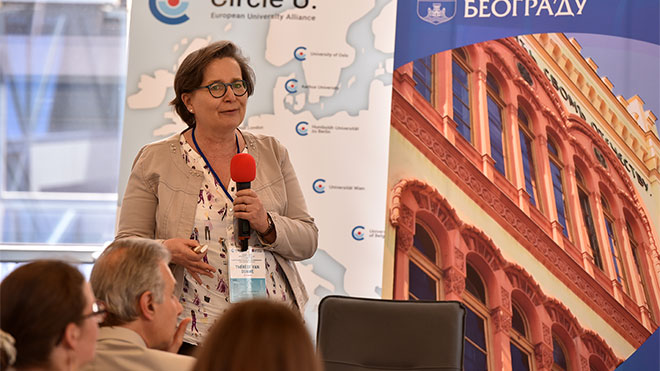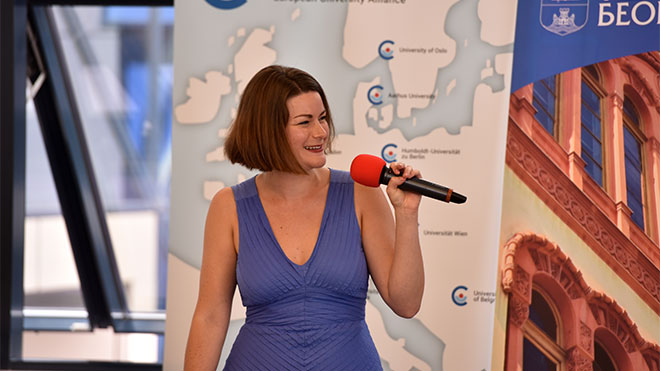Five cups of humility and plenty of time
“RE-Member” looks at Belgian family and collective memories related to WWII collaboration and the colonization of Congo. Aline Cordonnier (UCLouvain) explains what it means to work in the field of memory studies.

“The project I am representing here belongs to the field of memory studies. This is kind of exploding at the moment and becoming an interdisciplinary field by definition. Since 2017, there is the truly interdisciplinary Memory Studies Association and there are a few dedicated journals as well. The biggest one is simply called ‘Memory Studies’ and last year, we published in the inaugural issue of ‘Memory, Mind and Media’. On our project ‘RE-Member’, we’ve been working with historians, obviously, and political scientists, and I myself am a cognitive psychologist.
In psychology, when we study memory, we usually take an individual and put them in a lab with lists of words, so we have control over everything. But then you talk to historians doing oral history, and they interview people, and they let them talk for as long as they want, with a lot of freedom. So, our methods are often almost incompatible. But for our project, we really wanted to integrate them somehow. It took a lot of time and discussion to try and create a method that would be a common ground. It's still a work in progress, it's not easy and at the end, sometimes we don't get what we want, simply because it's not feasible within this interdisciplinary network. For this kind of collaboration, you definitely need some humility. I had to learn to accept that we don't have all the answers and our method is not necessarily always the best.
For this kind of collaboration, you definitely need some humility. I had to learn to accept that we don't have all the answers and our method is not necessarily always the best.
One drawback of interdisciplinary research is that it is quite slow. That means that, when they compare my track record with other psychologists, I'm not as competitive. I don't have as many publications, and the ones I have are in interdisciplinary journals, which are not as well recognised within my own field. So, even though for grants they always like to see the interdisciplinary part, as an individual researcher hoping to get a permanent position, it's actually not that good. But the work is exciting, that's why I keep doing it.
Receiving the ICUP first and foremost means recognition, that what we do matters and that, even though the themes are very Belgian, even people in other countries find it interesting. It's hopefully also good for the CV, to show that we've been recognised by people outside of our fields. And it's an opportunity to meet other researchers and hear about what they do.”
A gallon of good governance and a quart of recognition
Project “Be.Hive” is all about strengthening primary care in Belgium. Thérèse Van Durme (UCLouvain) shares what matters most when working with researchers and practitioners from diverse fields.

“Our project gathers 31 researchers interested in primary care from three universities and three university colleges. We also come from a variety of disciplines: there are medical doctors, nurses, sociologists, psychologists, occupational therapists, pharmacists and physiotherapists. This diversity becomes a living value in our research and helps us really make an impact.
Of course, the challenge that comes with having such a variety of backgrounds and institutions is that people have different definitions of good research and teaching. Good scientific writing for a sociologist is very different to good scientific writing or research according to a public health researcher – in terms of the structure of an article, in terms of types of validation of what is considered robust research.
To deal with this, governance is crucial: Who makes decisions? How are decisions made? We opted for what we call sociocracy – a way of decision-making where we look at each other in a very egalitarian way. Each one is an expert in one field. And what that person has to say, needs to be heard. It's not top-down where a coordinator says how it's done. That’s not easy and there are tensions, in part also because we do not have the time. There is a pressure to publish, for instance, and the time that you put in these meetings to resolve conflicts and tensions is time that is missing for the research. But dedicating resources to this, clarifying the roles, is key.
As a coordinator, I have been doing a lot of that work: Lots of logistics, getting a lot of pushback as well - that's part of the job. Sometimes, at the end of the day or the week, emotions run high. But even with these inevitable tensions, we are still there, and all are willing to continue the partnership. So, that's something very positive for the next call.
Receiving the ICUP now is a fantastic opportunity because this is the moment to let people know about what we are doing.
The financing for Be.Hive came from a private fund and will run out in December. But we were already asked to write a new business plan for a second phase. So, if all goes well, we will continue. Receiving the ICUP now is a fantastic opportunity because this is the moment to let people know about what we are doing.”
A pinch of seed funding and pounds of enthusiasm
Janet Rafner (Aarhus University) runs Crea.Visions. She is a researcher in human-computer interaction and citizen science – and a strong proponent of joining forces beyond disciplinary boundaries.

“My project is called Crea.Visions and it uses co-creativity between humans and artificial intelligence (AI) to allow anyone in the general public, regardless of their skills at painting or drawing or anything like that, to imagine and visualise potential futures for their city.
More than 50 people are part of the project in a variety of different ways – so many that I couldn’t attach all the CVs to the ICUP application! We are working across many different disciplines: art history, computer science, social science, cognitive science, business and management and human-computer interaction. I have always been fascinated by the possibilities of interdisciplinary work – and I would say that for the topic we are tackling, there actually is no adequate alternative to it.
I have always been fascinated by the possibilities of interdisciplinary work – and I would say that for the topic we are tackling, there actually is no adequate alternative to it.
I’m sure we would see a lot more interdisciplinarity if there were more real incentives to do it. For example, in this project, I took on one-on-one stakeholder alignment. That's hours of time talking with each of the partners. And that’s not research time, nor is it teaching hours. There is not part of an academic position that covers this type of work to build interdisciplinary relations. So, that is more or less time I volunteer so that I can do the academic work. You really have to love what you do! Recognition – for example in the form of the ICUP – also means a lot.
Funding is another crucial factor. Crea.Vision has received funding from various sources – including seed funding from Circle U. I think this is an amazing contribution because often new interdisciplinary projects won’t be selected by large funding agencies – they can’t be sure that the coordination between the different partners is going to work and that they will get any results published. So, this kind of support from Circle U. is really meaningful because it allows new projects to get started and to bring people together to take the first steps.”
 |
Subscribe to the monthly Circle U. newsletter. |